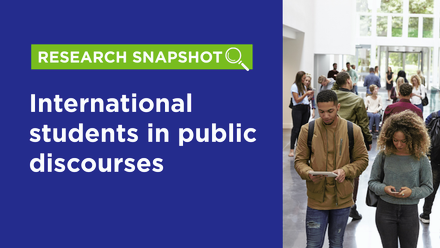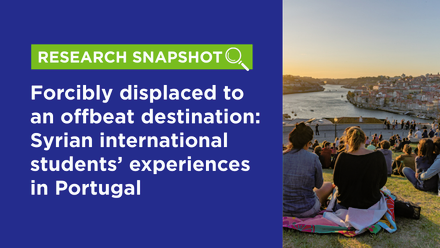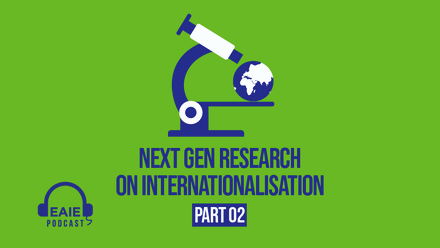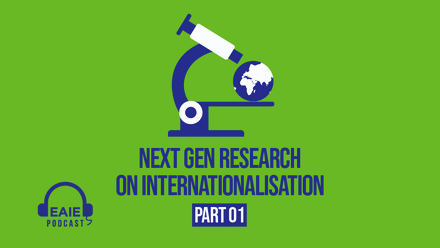Understanding international student needs: ESN Survey results

The Erasmus Student Network (ESN) believes the best way to understand students' challenges, needs and ideas is to ask them directly. With that spirit in mind, the ESN Survey was initiated in 2005, under the name ESNSurvey 2005: The experience of studying abroad.
Sixteen years and 14 editions down the line, today, the ESN Survey is one of the key research publications on student mobility. Led by ESN volunteers, the survey series has gathered more than 200,000 answers and analysed the mobility experience from all kinds of angles, from economic impact to participation in democratic life.
It is essential to provide continuous training and updates to your educational agents.
The 14th edition of the ESN Survey was launched in 2021 and collected more than 11,100 valid answers. More than half of respondents participated in mobilities during the COVID pandemic. Beyond the pandemic situation, we also wanted to explore how students evaluate their experiences concerning the key principles to which higher education institutions commit as holders of an Erasmus Charter for Higher Education, such as accommodation provision, pre-departure preparation or reintegration. The findings allow practitioners and policymakers to reflect on what works, what should be improved and where there is potential to strive for more.
Here we lay out some of the key findings from the survey and suggestions for future action. The full report from this research will be presented in the next few months.
Satisfaction of students: progress and challenges ahead
The findings of the ESN Survey show that students report more satisfaction with the services offered by host institutions compared to home institutions and that challenges remain with certain services such as accommodation, local integration or reintegration activities. However, the overall level of satisfaction is remarkable considering all the challenges brought by the pandemic.
The findings of the ESN Survey show that students report more satisfaction with the services offered by host institutions compared to home institutions...
Indeed, overall satisfaction shows improvements from previous editions of the ESN Survey that covered services provision. For example, in 2016, 11.2% of students were dissatisfied by services provided by host institutions, while only 2.05% report the same dissatisfaction in the current edition. The percentage of students satisfied or very satisfied has risen accordingly – to 39.19% and 43.51% in 2021 from 31.3% and 31.7% in 2016. Overall, 82.70% of students are satisfied or very satisfied with services provided by the host institution.
However, the difference between home and host institutions is significant – only 67.25% are satisfied or very satisfied with services at the home institution, with 14.32% dissatisfied or very dissatisfied with home institution services.
Additionally, the service that shows the highest levels of dissatisfaction – reintegration activities, where 22.95% of respondents registered dissatisfaction and 38.11% "not applicable" answers – follows the trends of previous ESN Surveys, such as the 2016 edition. The results on the involvement in alumni communities upon return are rather close to the overall result on reintegration activities.
Meanwhile, 17.77% of respondents were dissatisfied with accommodation support, and 16.72% of respondents were dissatisfied with accommodation provision, highlighting the prevalent issues with accommodation for mobile international students, which has long been a contentious issue.
Dissatisfaction with local integration activities is also very high – 17.51% of respondents were dissatisfied by this. A similar percentage (16%) is dissatisfied with different mentoring support services.
Many of these challenges can be approached in a synergistic manner. An alumni involvement strategy in collaboration with student and alumni organisations can help improve local integration. Collaboration with local authorities might improve housing provision while offering a wider range of opportunities for cultural integration.
The impact of mobility
The survey findings prove that mobility experiences can be a great tool to create global citizens and tackle the biggest challenges of our time. More than 55% of respondents indicate that their mobilities have been very or extremely impactful on their interest in the topic of environmental sustainability and climate change, making it the most commonly reported area in which students gained more interest. Human rights follow closely, with more than 53% of respondents indicating that mobility was very or extremely impactful in raising their interest in this area.
Confirming the trends of previous ESN Surveys and other research publications, mobility seems to lead to more mobility: 42% of Erasmus+ students strongly agree and would like to study abroad after graduation, while 46% feel strongly about living abroad after graduation. Along the same lines, 43% would prefer to have a job abroad after graduation, while 41% consider applying for a job in their home country with an international component. Remarkably, 54.40% would like to have another international experience during their studies.
These findings should be considered for the creation of internationalisation strategies that can combine different mobility opportunities and internationalisation actions.
These findings should be considered for the creation of internationalisation strategies that can combine different mobility opportunities and internationalisation actions. After their mobility experiences, students might be keener to lead actions to make their university or community greener or to participate in cooperation projects with students from other universities.
Timely grants for more inclusive mobility
The findings of ESN’s 2021 Social Inclusion & Engagement in Mobility research report show how important the timing of grants is when it comes to facilitating the participation of students with fewer opportunities. However, more than 26% of 2021 ESN Survey respondents reported receiving their grants more than one month after the beginning of their mobility experience. Therefore, during the next few years, we believe that universities should prioritise making sure that all students receive their grants on time and that the pre-financing option is also explored to support the participation of disadvantaged students.
Local integration and interaction
Fostering meaningful interaction with local students and local communities more broadly can increase the impact of mobility experiences beyond participants, improving internationalisation at home and breaking the mobility bubble. However, proper guidance and support are needed to ensure that those interactions take place. Interaction leads to better integration and tends to result in greater satisfaction.
When asked about their integration in the local community, 16.19% of the participants declared that they were fully integrated, 36.63% integrated, 29.24% neutral, 13.73% not integrated and 3.43% totally not integrated.
Participation in organised groups of different kinds is one of the most effective ways of allowing that interaction to happen. Our data tells us that 16.64% of all respondents joined a local sporting club/team, 13.81% joined a local student/youth association, 7.48% volunteered in the local community, 5,01% found a part-time job, 5.01% joined an art/music/drama club, 4.33% joined the local student union/council and 54.67% did not do any of these activities.
These results show that local integration remains a challenge and that more should be done to increase the interaction with local communities.
These results show that local integration remains a challenge and that more should be done to increase the interaction with local communities. ESN believes that a huge potential lies in volunteering initiatives involving international students, which can help them draw connections between societal challenges and local realities. The SocialErasmus+ project has proposed several ideas to increase the implementation of these initiatives among higher education institutions.
Conclusion: let’s continue seizing the transformative power of mobility
The key findings of the ESN Survey show how much has been achieved in the field of student mobility and what a fantastic tool mobility is to equip students with competencies to face today´s challenges and become better citizens. But at the same time, it also proves that there is still so much we can do to fully unleash the transformative potential of learning mobility. In doing so, we will not only be benefiting mobile learners, but society as a whole.
This article was written by Juan Rayón with and on behalf of the ESN Survey team.






